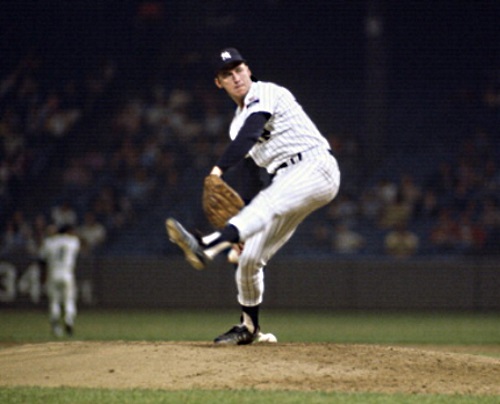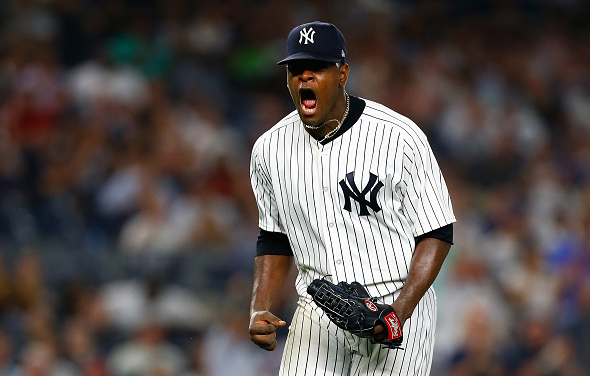The emergence of rookie catcher Gary Sanchez this Summer has been a Godsend for the New York Yankees. A team that was bobbing up and down in a pond of mediocrity suddenly came to life when Sanchez and other youngsters (known as the “Baby Bombers”) arrived in the Bronx. But, Sanchez is not the first Yankee rookie to have a crucial contribution in a playoff drive.
The late-season call-up that arguably had the biggest impact on a Yankees’ season was pitcher Mel Stottlemyre. Many current Yankees’ fans only know of Stottlemyre for his excellent work as a pitching coach for the Yankees and the New York Mets. But, without the lanky right-hander, it’s possible the Yankees would not have reached the 1964 World Series.
Stottlemyre worked his way up the minor leagues after he signed an amateur free agent deal in 1961. His fourth season in the minors – at which time he was 13-1, 1.89 with the Richmond Virginians – earned him a call-up to the Majors in August 1964. Stottlemyre joined a rotation that included future Hall of Fame member Whitey Ford, second-year lefty Al Downing, and fellow right-handers Jim Bouton and Ralph Terry. (The norm of the day was a four-man rotation; the Yankees used five to six pitchers to give more rest to starters when needed.)
The 22-year old made his Major League debut on August 12, 1964, against the Chicago White Sox. The Yankees entered that day in third place, 3.5 games behind the Baltimore Orioles in the America League standings. The White Sox sat between them, one game in back of the Orioles.
Chicago had won the first two games of the scheduled four-game series and had 13-year veteran Ray Herbert on the mound for the third game of the series. Stottlemyre responded with a complete game victory. He scattered seven hits, walked one batter, and struck out one batter. He even picked up his first Major League hit. The Yankees won 7-3 and split the series with a 5-2 victory the next day.
Stottlemyre’s next two starts were crucial victories.He raised his record to 2-0 with an eight-plus inning, 3-1 win over Baltimore. The victory enabled the Yankees to take two of three against the O’s and moved them to within 2.5 games of first place in the AL. The rookie’s next start came in the second game of a doubleheader with the Boston Red Sox. The Yankees had lost six straight, including the first game of the twin bill. Stottlemyre took the mound with the Yankees 5.5 behind Baltimore and fading fast.
“Stot” responded with a complete game shutout to end the skid and improved his record to 3-0. On the downside, Stottlemyre had walked too many hitters. It continued in his next outing, a 2-0 loss to the Washington Senators. Stot had the first blemish on his won/loss record, but the Yankees didn’t lose any ground in the standings.
On August 30, Stottlemyre defeated the Red Sox again to move the Bombers within three games of the Orioles. Things didn’t go so well his next time out. Stottlemyre was sent to the showers early in a 4-2 loss to the California Angels. The Yankees dropped to four back in the standings in the process.
Though he lost his first game in September, Stottlemyre then reeled off five straight victories. He allowed just eight earned runs in 41.2 innings pitch (1.73 ERA) to lower his season ERA to 1.97. With Baltimore and Chicago idle on September 17th, Stottlemyre’s victory over the Los Angeles Angels moved the Yankees into a virtual three-way tie with the Orioles and White Sox. Just .002 percentage points separated New York from their two contenders.
The Yankees moved into sole possession of first place on September 19th, with 15 games left in the season. It was the first since July 29 that the Yankees sat alone atop the AL.
When Stottlemyre and Ford started and won both ends of a doubleheader against the Cleveland Indians on September 22nd, the Yankees pushed their lead over the Orioles to 2.5 games. The White Sox faded to 3.5 back with a 1-0 loss to the Angels. Stottlemyre’s winning streak ended in Game 160, but two days later the Yankees clinched the American League pennant.
With a relief appearance to finish the season, Stottlemyre’s rookie campaign ended with a 9-3 record and a 2.09 ERA. Stottlemyre started three games in his one and only World Series appearance. The 22-year old beat legend-in-the-making Bob Gibson in Game 2 to even the Series at a game apiece. The two met up again in Game 4 with the Yankees holding a 2-1 lead in the Series. Stottlemyre went seven innings, allowed one earned run, and left the game down 2-0. Tom Tresh temporarily saved the day when he hit a game-tying 2-run home run off of Gibson in the bottom of the 9th inning, but St. Louis won in 10.
The Series went the full seven games with Stottlemyre and Gibson facing off again after just two days’ rest. The nearly 29-year old Gibson wasn’t at his best, but he was the better of the two pitchers in the finale. Gibson went the distance in a 7-5 Cardinals’ victory, while Stottlemyre was gone after four innings with the Yankees in a 3-0 hole.
The Yankees were 65-45 (.504) when Stottlemyre joined the ball club in August. From that point forward the Yankees won 34 of their remaining 52 games (.654). Just as Sanchez may not garner a Rookie-of-the-Year vote this year, Stottlemyre received no votes in his rookie season. For unfortunate, however, the Yankees were on their descent from the mountain top. They wouldn’t make their way back up the hill until the year (1975) after Stottlemyre retired. (Imagine a rotation led by Catfish Hunter and Mel Stottlemyre.)
In 1998, with no social media and not much coverage, fans didn’t follow their team’s minor leaguers closely. So, when rookie Shane Spencer was called up late in the season, a lot of fans said, “Who?” That was the case despite the 62 home runs he had hit in the prior two minor league seasons.
The outfielder made his debut and played in one other game in April and played another in June. He was called up for another stint from July 28 through August 12, in which he had one remarkable game. In August 7th rout of Kansas City, Spencer went 5-5 with his first two Major League home runs and three RBI. He also scored four runs. Outside of Spencer’s big day, he was 4-18 and was shuttled back to the minors until rosters expanded on September 1st.
Unlike Stottlemyre’s rookie year, the Yankees were running away with the American League East when Spencer returned in September. The 26-year old homered in his first time back in the lineup, but it wasn’t until September 18 that his bat really took off.
In a 15-5 win over the Tampa Bay Devil Rays, Spencer clubbed his first career grand slam. Four days later he clubbed a pair of solo shots in the first game of a double hitter vs. the Indians. For the day, he was 5-7 with four runs scored. The following day, Spencer’s three-run home run helped the Yankees come back from a 3-0 deficit to beat the Tribe, 8-4.
It was as if it was the second coming of Babe Ruth…fans stayed in their seats at Yankee Stadium or stayed glued to their TV sets every time Spencer came to the plate. And, Spencer gave them what they wanted. With the Devil Rays in town on September 24, Spencer belted his second grand slam of the month. He was kept off the scoring sheet in Game 160 (no hits in two at-bats), but finished the season with a bang. Two of them, actually. His solo home run in the final Saturday regular season game helped make a 20-game winner of David Cone.
Up 2-1 in Sunday’s regular season finale, Spencer broke the game open with yet another grand slam. In his final nine games of the year, Spencer went 10-29 with seven HR and 20 RBI. (For the year, he finished with 10 HR and 27 RBI in 67 at-bats.)
Spencer hit two more home runs in the division series win over Texas and collect the first of his three World Series rings. The former 28th round pick (1990) never matched the success he had in his rookie season, but he will always have a September to remember.
Back in the olden days of 2005, there was no Wild Card to reach the playoffs. Your team was a division winner or they went home early to play golf. It didn’t take long for the front office to realize they’d made a mistake in signing 35-year old free agent Tony Womack to play second in 2005. Robinson Cano was part of talks when the Yankees tried to obtain Randy Johnson in 2005. The deal fell through, but between Double-A and Triple-A Cano finished the 2004 season with 13 HR, 29 doubles, and 10 triples.
The Yankees brought Johnson on board as a free agent in ’05, so Cano was playing at Triple-A Columbus when the Yankees came a-calling in May. A native of baseball-hotbed San Pedro de Macoris in the Dominican Republic, Cano made quite an impression with both his bat and his tremendous defensive range. Through his first three months in the Major Leagues, the rookie produced eight home runs and 39 RBI in 75 games.
The Yankees entered August 2.5 games behind Boston in the AL East. Cano went through an awful month at the plate. He only managed to post a .513 OPS, but the Yankees finished the month in the same spot they started…2.5 games behind Boston in the division. Cano bounced back in September with five home runs and 17 RBI as the Red Sox and Yankees fought neck and neck for the division title.
Cano went 5-9 when the Yankees took two of three in an early September series in the Bronx. But with the Yankees in first place by one game ahead of Boston, the two teams met for the final three games of the regular season. Cano had a pair of hits and a run scored, but the Red Sox took the opener 5-3 to move into a tie for first place.
The Yankees’ second baseman was held to one hit on Saturday, but he picked up an RBI in the Yankees 8-4 division-clinching win. There was one game remaining on the schedule, but MLB rules in 2005 dictated that the Yankees won the tiebreaker based on having the better record head-to-head with Boston. The Sox won Sunday’s game to finish with the same record as New York – 97-65 – but the Yankees won 10 of their 19 contests with Boston.
Cano drove in five runs in the division series, but the Yankees were eliminated by the Angels in five games. Cano went on to finish second in the AL Rookie-of-the-Year voting to Oakland’s Huston Street.
Gary Sanchez’s future is wide open. Despite his 14 HR and 25 RBI in 37 games this season, the Yankees chances of making the playoffs are dim. But, the future for Sanchez and the Yankees looks quite bright.




